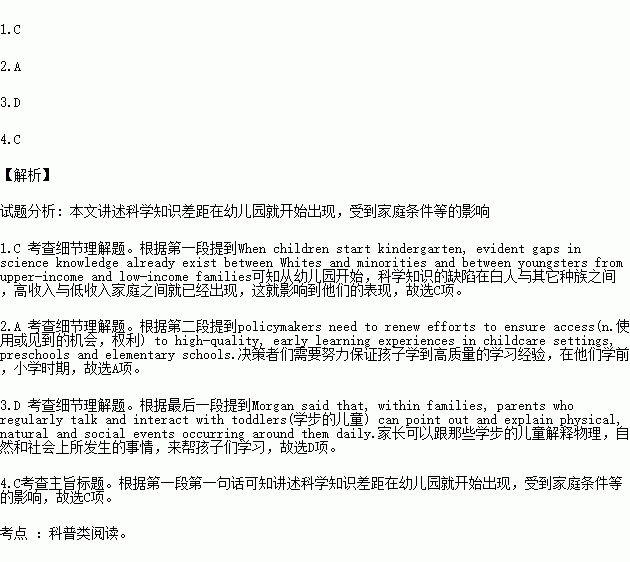题目内容
When children start kindergarten, evident gaps in science knowledge already exist between Whites and minorities and between youngsters from upper-income and low-income families. And they often deepen into significant achievement gaps by the end of eighth grade if they are not dealt with during elementary school.
The findings suggest that, in order for the United States to maintain(维持) long-term scientific and economic competitiveness in the world, policymakers need to renew efforts to ensure access(n.使用或见到的机会,权利) to high-quality, early learning experiences in childcare settings, preschools and elementary schools.
The researchers’ study tracked 7,757 children from their start in kindergarten to the end of eighth grade. Researchers found that, among kindergarteners with low levels of general knowledge, 62 percent were struggling in science by the time they reached third grade and 54 percent were struggling in that subject in eighth grade. And general knowledge gaps between minorities and Whites were already large at the time when students began kindergarten.
“Children growing up in low-income families typically experience comparatively fewer early opportunities to learn about the natural and social sciences,” the authors wrote. “Their parents often have lower educational levels and therefore less science knowledge themselves as well as fewer resources available to direct the children’s academic growth. Children raised in poverty often attend poorly resourced schools that futher limit their academic opportunities.”
Morgan said that, within families, parents who regularly talk and interact with toddlers(学步的儿童) can point out and explain physical, natural and social events occurring around them daily. This might help youngsters learn facts and concepts that will prepare them to take better advantage of science instruction they receive during elementary and middle school.
1.Which may be the possible result of the gaps in science knowledge during kindergarten?
A. Children from rich families will behave better in life.
B. Children from minorities may have less desire for learning.
C. Children’s academic performance afterwards will be affected.
D. The gaps will disappear automatically when children grow up.
2.What did the researchers suggest policymakers do?
A. Make superior education available to children.
B. Narrow income gaps between different families.
C. Give extra lessons to children from poor families.
D. Strengthen competitive awareness of kindergarteners.
3.What can parents do to help their toddlers learn?
A. Give them more nutritious food
B. Offer them more learning resources.
C. Let them attend science courses for kids
D. Greate learning opportunities in daily life.
4.Which of the following can be the best title for the text?
A. Income Gaps Affect Children’s School Performances
B. Provide More Available Access to Childhood Learning
C. Science Knowledge Gaps Are Obvious in Kindergarten
D. Equal Education Is Important in Kindergarten
 小学同步三练核心密卷系列答案
小学同步三练核心密卷系列答案
